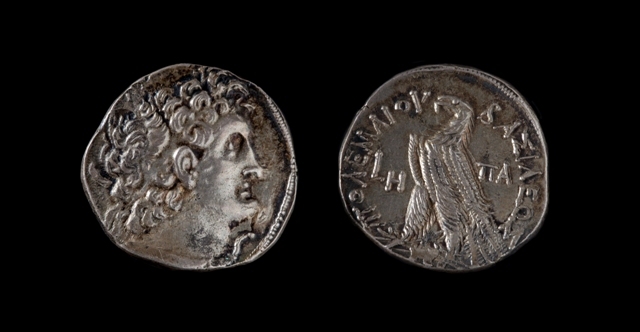Ptolemaic, Silver Tetradrachm
Dublin Core
Title
Ptolemaic, Silver Tetradrachm
Subject
Ptolemaic Kingdom, Ptolemy IX Soter II (first reign 116-107 BCE), Silver Tetradrachm, 110-09 BCE.
OBVERSE: Head of Ptolemy I wearing diadem and aegis right, set in dotted border.
REVERSE: Eagle sitting on a fulmen (winged thunderbolt of Zeus). Inscription above: "PTOLEMAIOU BASILEWS” (= Ptolemaiou Basileos, "of King Ptolemy). In left field, L and year "H" (8. year = 110/09 BCE). Mint mark on right: "PA" (=Alexandria).
OBVERSE: Head of Ptolemy I wearing diadem and aegis right, set in dotted border.
REVERSE: Eagle sitting on a fulmen (winged thunderbolt of Zeus). Inscription above: "PTOLEMAIOU BASILEWS” (= Ptolemaiou Basileos, "of King Ptolemy). In left field, L and year "H" (8. year = 110/09 BCE). Mint mark on right: "PA" (=Alexandria).
Description
The first Ptolemy, Ptolemy I Soter, was elected satrap of Egypt after the death of Alexander the Great in 323 BCE. In 305, he declared himself king of Egypt and started the Ptolemaic dynasty that would rule for almost three-hundred years.
This coin, while depicting Ptolemy I Soter, was issued under Ptolemy IX Soter II (first reign 116-107 BCE). When Ptolemy IX’s father, Ptolemy VIII Euergetes died, he declared his wife, Cleopatra III, co-ruler with whomever of their sons she would chose. Cleopatra chose her younger son, Ptolemy Alexander, but faced outcry from the people. She then installed her older son, the producer of this coin, Ptolemy IX Soter II. Swapping her two sons back and forth from co-ruler to king of Cyprus, they continued to rule until 107 BCE when Cleopatra convinced the people of Alexandria that her older son Ptolemy IX Soter II was trying to kill her. Leaving Alexandria, he fled to Cyprus.
In 101 BCE, Cleopatra was murdered by her younger son, Ptolemy Alexander, when she tried to swap brothers once again. He took control of Egypt until the people rebelled against him in 88 BCE, allowing Ptolemy IX Soter II to return to the Egyptian throne. Ptolemy Alexander was killed at sea while attempting to seize Cyprus and Ptolemy IX was left to rule in peace until he died in 81 BCE.
The Greek letter Eta (H), dates the coin to the eighth year of Ptolemy IX Soter II’s rule (110/109 BCE), two years before he was driven into exile by his mother. Instead of featuring himself on the coins, he featured the founder of the dynasty, clearly attempting to emphasize his legitimacy and power as the descendent of this powerful man.
This coin, while depicting Ptolemy I Soter, was issued under Ptolemy IX Soter II (first reign 116-107 BCE). When Ptolemy IX’s father, Ptolemy VIII Euergetes died, he declared his wife, Cleopatra III, co-ruler with whomever of their sons she would chose. Cleopatra chose her younger son, Ptolemy Alexander, but faced outcry from the people. She then installed her older son, the producer of this coin, Ptolemy IX Soter II. Swapping her two sons back and forth from co-ruler to king of Cyprus, they continued to rule until 107 BCE when Cleopatra convinced the people of Alexandria that her older son Ptolemy IX Soter II was trying to kill her. Leaving Alexandria, he fled to Cyprus.
In 101 BCE, Cleopatra was murdered by her younger son, Ptolemy Alexander, when she tried to swap brothers once again. He took control of Egypt until the people rebelled against him in 88 BCE, allowing Ptolemy IX Soter II to return to the Egyptian throne. Ptolemy Alexander was killed at sea while attempting to seize Cyprus and Ptolemy IX was left to rule in peace until he died in 81 BCE.
The Greek letter Eta (H), dates the coin to the eighth year of Ptolemy IX Soter II’s rule (110/109 BCE), two years before he was driven into exile by his mother. Instead of featuring himself on the coins, he featured the founder of the dynasty, clearly attempting to emphasize his legitimacy and power as the descendent of this powerful man.
Source
Gift of James and Aneta McIntyre, Hallie Ford Museum of Art, Salem, OR. 2006.010.018
Date
110-109 BCE
Rights
Hallie Ford Museum of Art
Format
1.420 cm
25.800 gr
25.800 gr
Language
Greek
Type
Coin
Identifier
Ptolemy IX
Coverage
This item can be viewed on Hallie Ford Museum of Art's website.
Citation
“Ptolemaic, Silver Tetradrachm,” Hallie Ford Museum of Art Exhibits, accessed February 25, 2026, https://library.willamette.edu/hfma/omeka/items/show/70.
